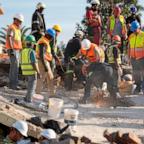Assessment of Bone Growth Stimulator Is Mixed
July 1 -- TUESDAY, June 30 (HealthDay News) -- A relatively new agent that stimulates the creation of new bone as part of spinal fusion surgery is being increasingly used in the United States, although costs and some complication rates also appear to be higher with its use, a new study reports.
The therapeutic agent, known as bone-morphogenic protein, or BMP, is now used in at least 25 percent of spinal fusion surgeries.
"The use of BMP is rapidly increasing every year," said the study's lead author, Dr. Kevin Cahill, a neurosurgeon at Brigham and Women's Hospital in Boston. The study found that more complications occurred in procedures involving the front part of the neck -- anterior cervical fusions -- when BMP was used.
"In the neck, there's not a lot of extra room, and there seems to be some swelling associated with the use of this product," Cahill said. The most common complications from BMP in neck procedures were difficulty swallowing and hoarseness, according to the study, which is in the July 1 issue of the Journal of the American Medical Association.
The study did not find an increase in complications in other fusion procedures.
Nonetheless, other surgical experts expressed the need for caution.
"This is a very potent substance, and I don't think anyone doubts that it works, but we don't know what dosages are right in each area, and we don't know if it's the right thing to do economically," said Dr. Douglas Burton, an orthopedic surgeon at the University of Kansas Hospital in Kansas City.
And Dr. Richard Fessler, chief of surgery and a neurosurgeon at St. John Hospital and Medical Center in Detroit, said that the study's finding "underscores why off-label use shouldn't be performed indiscriminately."
"We've increased the cost of this procedure, but we're unsure of the effect of BMP in the long term," Fessler said.
BMP -- a protein that the body naturally makes that tells stem cells to form bone -- was approved in 2002 by the U.S. Food and Drug Administration for use in spinal fusion surgeries in the lower back area. Because it promotes bone growth, BMP appears to be helpful in fusion surgeries because it may speed the process and possibly reduce the need for a second operation.




